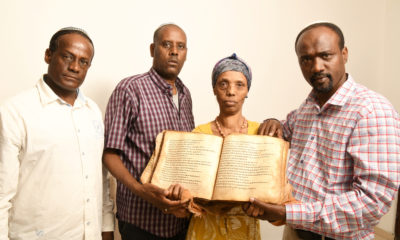
World
The extensive impact of the Ethiopian crisis
Foreigners are being urged to leave Ethiopia immediately while commercial flights are still operating. Israel, Britain, and the United States have advised against all travel to the country, except for Addis Ababa Bole International Airport (where advice remains against all but essential travel).
This comes as thousands of opposition fighters are just more than 300km from the capital Addis Ababa, which they’ve vowed to overthrow. Meanwhile, the United Nations (UN) has warned that the risk of the country “descending into widening civil war is only too real”. The government has detained at least 16 UN staff and dependants without any explanation.
Last week, Prime Minister Abiy Ahmed Ali, who won the Nobel Peace Prize two years ago, declared a state of emergency. Since then, police have been going door to door in the capital arresting, without a court order, anyone suspected of collaborating with the Tigray People’s Liberation Front (TPLF). The government considers its members secessionist terrorists.
For a year, Addis Ababa and Tigray fighters have been at war, mostly in the north of Ethiopia where the group is dominant. In recent months, the conflict escalated rapidly after fighters began to retake most of the Tigray province and expand into neighbouring regions. The civil war now threatens to engulf the capital.
The TPLF claims to be pushing toward Addis Ababa to force the government to lift restrictions on aid flowing to their region. The UN accuses Ahmed Ali of operating a de facto blockade which he denies. But it has been four months since the last big shipment of medicines and health supplies were allowed into the north of the country.
More than seven million people are estimated to need humanitarian assistance with about 400 000 people in Tigray alone living in famine-like conditions. Thousands have been killed, and more than two million have fled their homes since last November.
The UN reports “extreme brutality” being meted out by both sides on civilians. It says there are reasonable grounds to believe that violations of international human rights and humanitarian and refugee law are being carried out by all sides. Their intransigence has scuttled hopes of a ceasefire that international mediators including the African Union and United States were pressing for.
The war has also sparked an internal conflict in Israel. Since fighting broke out a year ago, more than 2 000 Ethiopian Jews have been airlifted to Israel in state-run operations. “We must continue to act to bring them over to Israel quickly,” vowed Israeli President Isaac Herzog recently.
But after the new immigrants were settled in various absorption centres, suspicion about the information they had given to Israeli authorities started surfacing. A probe by the Immigration and Population Authority raised “serious doubts” as to whether 61 of them were, in fact, Jewish. In spite of their affidavits, an investigation also found that “most of the petitioners didn’t come from a combat area as claimed, and weren’t in life-threatening danger”.
It turned out that the list of names compiled for rescue came from a man who emigrated to Israel from Ethiopia 25 years ago. According to media reports, among the 61 were his sons, his ex-wife, who is Christian, her husband, and their children, and a number of people he worked with in the past.
It has dampened efforts by Pnina Tamano-Shata, the Israeli aliyah and integration minister, to bring more Ethiopians to Israel. She is urging Prime Minister Naftali Bennett to speed up the immigration process. There are thought to be between 7 000 to 12 000 Ethiopian community members still waiting to make aliyah, many of whom live in the Tigray region, the heart of the conflict.
It’s here where Israeli intelligence officials are warning Israelis and Jews to be vigilant. According to Israeli media, the country’s national intelligence, the Mossad, recently thwarted multiple attacks by Iran against Israeli tourists and businessmen in at least three African countries. The targets were visiting Tanzania, Senegal, and Ghana.
Five suspects, all with African passports, have reportedly been arrested. The concern is that in countries where security is compromised, particularly in Africa, Iran is seeking to avenge the death of its top nuclear scientist, Mohsen Fakhrizadeh, who was assassinated last November. Tehran blames the Mossad.
The ongoing shadow war between Iran and Israel goes back decades, but Iranian efforts recently spiked. This is likely to continue until the country’s leadership feels it has achieved some kind of revenge and deterrence against Israeli attacks on it.
The Ethiopian crisis could provide fodder for increased attacks against Jews and Israelis in that country. Aware of this, the Israeli foreign ministry has started evacuating the families of Israeli diplomats from Ethiopia and is urging Israeli citizens residing in the country to exercise vigilance and be regularly updated on the progress of fighting in general and in the capital in particular.
Addressing the UN Security Council on 8 November, Rosemary DiCarlo, the UN under-secretary-general for political and peacebuilding affairs, said that in spite of much speculation about how the Ethiopian crisis would unfold in coming weeks, “in a country of more than 110 million people, more than 90 different ethnic groups, and 80 languages, no one can predict what continued fighting and insecurity will bring”.
The TPLF dominated Ethiopian politics for three decades before Ahmed Ali took power in 2018 and sought to reduce the group’s influence. Tigrayans are deeply resented by many of Ethiopia’s non-Tigrayans and Ahmed Ali has vowed to “bury this enemy with our blood and bones”. The prime minister has called the fight against former government soldiers and volunteers from the country’s Tigray region an “existential war”.
The conflict has already taken thousands of lives and spawned one of the world’s worst humanitarian crises. There are fears it will spill beyond the country’s borders as the heavyweight of the volatile region teeters on the brink of chaos.










